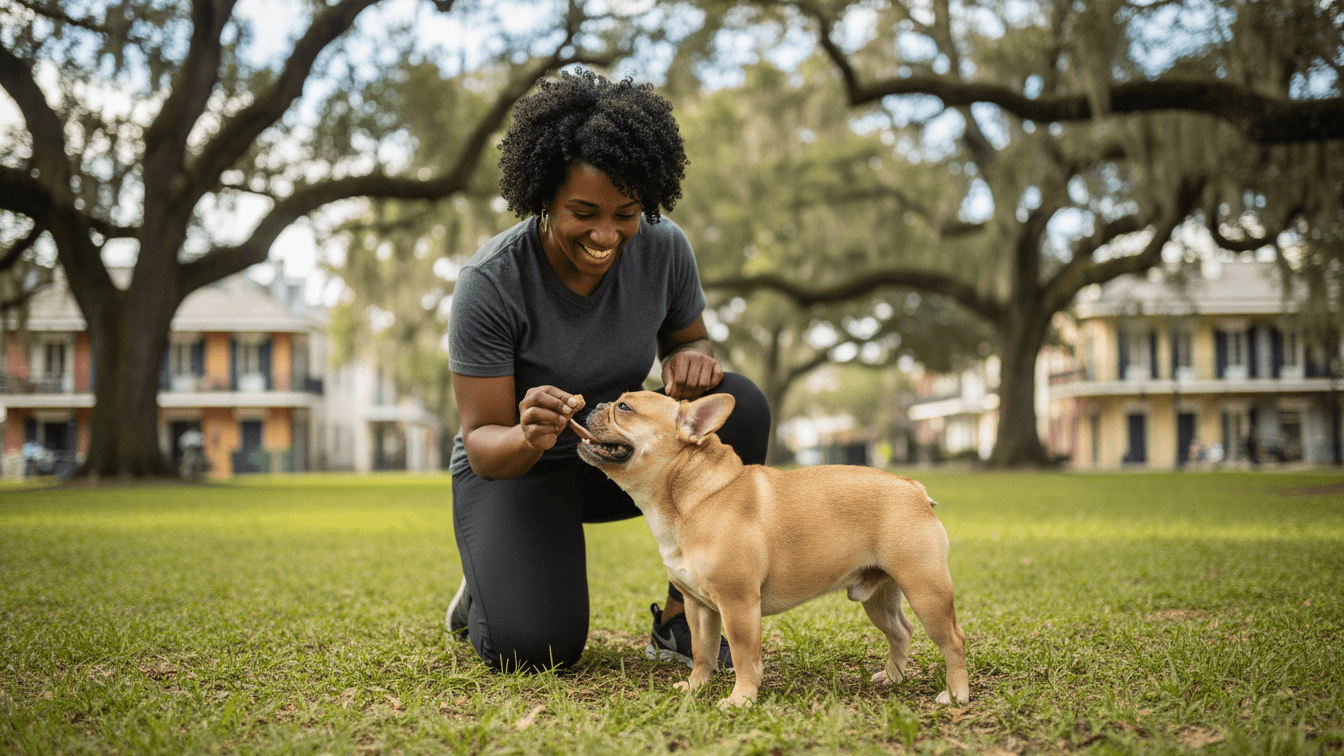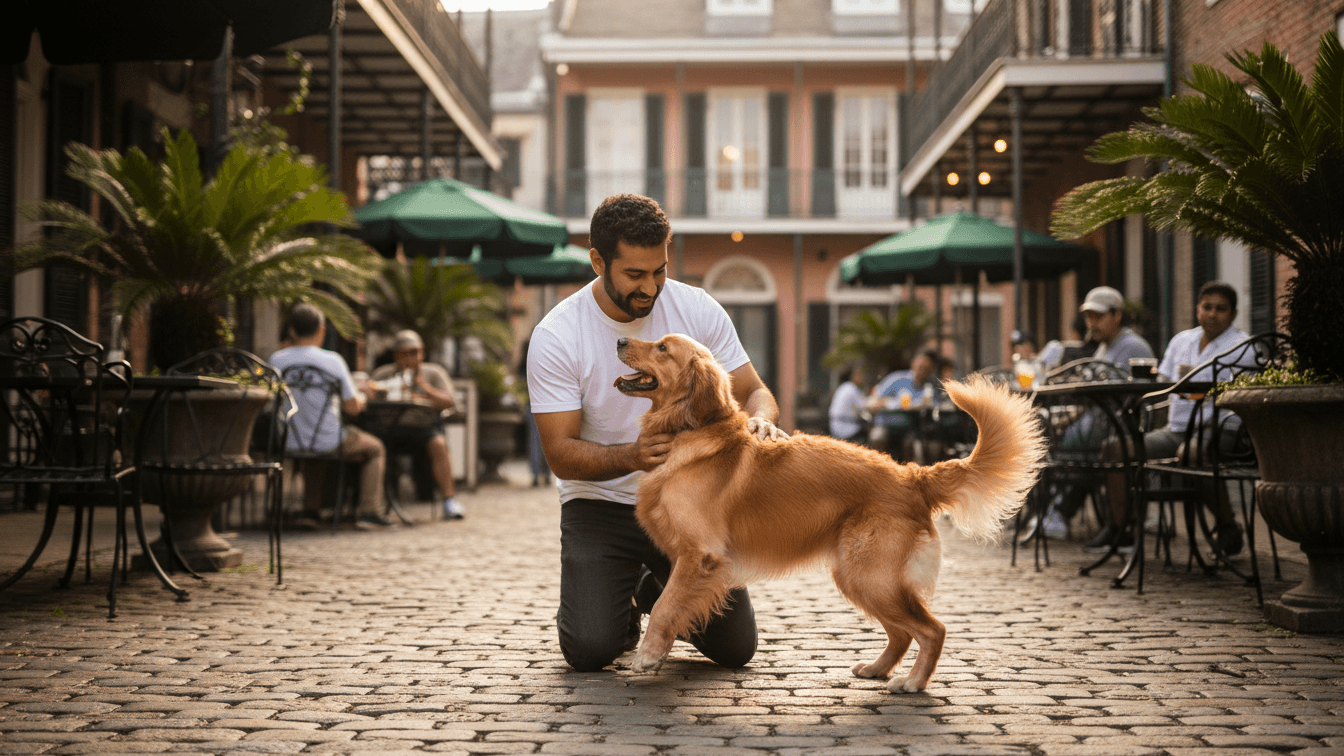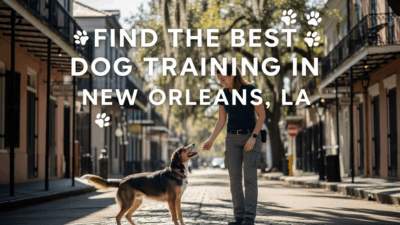Your Complete Guide to Choosing a Dog Trainer in New Orleans and Surrounding Areas
Living with a dog in New Orleans means navigating crowded French Quarter sidewalks, handling Mardi Gras parades, and finding safe spots to exercise between sudden thunderstorms and busy festival season. Your dog needs to stay calm when streetcars rumble past, ignore dropped beignets on Decatur Street, and keep their cool when second-line brass bands march through your neighborhood.
Orleans Parish has specific rules about leashes and noise, and finding a trainer who understands the unique challenges of raising a well-behaved dog in this city will make your life much easier. Whether you live Uptown near Audubon Park, in Mid-City close to City Park, in the Bywater with its busy restaurant scene, or out in Lakeview near the levee paths, your training program needs to prepare your dog for the constant sensory overload that comes with life in New Orleans.
How to Choose the Right Trainer
Start by looking for someone who uses positive reinforcement training and understands what daily life looks like here. Your dog should learn to walk calmly past jazz musicians on Royal Street, stay focused during street festivals, and handle restaurant patio dining without begging from strangers.
Credentials help you compare trainers quickly and understand their background. Common dog trainer certifications include KPA-CTP, CPDT-KA, or IAABC-CDBC for behavior problems. If your dog shows serious aggression or fear, look for a certified dog trainer with CBCC-KA or a science-based program like CTC.
In-home dog training works great for addressing problems exactly where they happen, like door manners when delivery drivers arrive or barking at passing parade-goers. Group classes make sense once your dog can focus around other dogs, especially before you try busy spots like the levee or Crescent Park.
Ask if the trainer carries liability insurance, which protects both of you if something goes wrong during training sessions. Insurance also shows that the trainer runs a legitimate, professional business.
Common Dog Training Methods Explained

Reward-based methods build trust while creating lasting behavior changes, and they help you follow local leash laws without relying on fear or pain. Positive reinforcement training teaches your dog what to do instead of just punishing what you don’t want.
Basic obedience covers sit, down, stay, place, recall, and leash training so your dog can handle walks through the Quarter, visits to dog-friendly bars, and neighborhood block parties without pulling or jumping on people. These skills form the foundation for everything else.
Puppy training focuses on socialization, potty training, bite control, crate comfort, and early leash manners. Starting early prevents bad habits from forming, especially important when you’re housebreaking a puppy in a shotgun house or apartment with limited yard access.
Behavior modification addresses fear, reactivity, resource guarding, or separation anxiety through careful desensitization and counterconditioning. For serious cases, ask if your trainer works with local veterinarians who can rule out medical causes or prescribe medication if needed.
Private lessons let you customize everything around your schedule and your dog’s specific needs, while day training can speed up results when your work schedule doesn’t allow for regular practice time. Some trainers will work your dog during the day, then teach you how to maintain the progress.
Dog training classes help your dog practice good manners around other dogs and people in a controlled setting. The best classes give dogs plenty of space, screen participants carefully, and teach calm behavior rather than just excitement.
Board and train programs mean your dog stays with the trainer for one to four weeks of intensive work, then you learn how to continue the training at home. These programs work best when the trainer includes thorough handoff sessions and follow-up support.
Service dog training and therapy dog training require extra structure, public-access skills, and a very clear step-by-step program. If you need a service dog for a disability, make sure the trainer understands federal ADA requirements and can prepare your dog for New Orleans environments like crowded restaurants and streetcars.
Stay away from trainers who use fear, intimidation, or pain to get results. Humane methods are safer for everyone, easier to maintain long-term, and much better for keeping peace with your neighbors in close-quarters living situations.
Average Cost of Dog Training in New Orleans, LA (Updated for 2025)
Prices around New Orleans and Orleans Parish depend on the trainer’s experience, how long sessions last, and where the training happens. Here’s what most local dog owners are paying in 2025.
| Service Type | Average Cost (New Orleans/Orleans Parish) |
|---|---|
| Puppy classes (4-6 weeks) | $175-$300 total |
| Group obedience classes (4-6 weeks) | $180-$325 total |
| Private lessons (60-90 min) | $125-$225 per session |
| In-home coaching packages (4-6 visits) | $475-$1,050 total |
| Day training (trainer works your dog + handoff) | $500-$1,100 per week |
| Behavior consult for reactivity/anxiety (initial) | $175-$275 |
| Board and train (2-4 weeks) | $2,200-$5,000 total |
You’ll probably pay extra travel fees if you live outside the main neighborhoods, and expect higher rates for complex behavior work like aggression or severe separation anxiety. Some expert dog trainers offer a free consultation or free evaluation before you commit to a package, which lets you meet them and discuss your goals without financial risk.
Make sure you understand what’s included in the total price, how the trainer tracks progress, and whether follow-up support is part of the package or costs extra.
Questions to Ask a Potential Dog Trainer
- What training methods do you use, and how do you keep training sessions positive and low-stress?
- What credentials do you have, like KPA-CTP or CPDT-KA? Do you keep up with continuing education such as CPDT-KSA?
- How will you customize the training program for my dog’s specific needs and our New Orleans lifestyle?
- Do you offer in-home visits, dog training classes, or day training, and which approach fits my goals best?
- How will we measure my dog’s progress and know when to add more distractions like crowds or street noise?
- What are the total costs, including any travel fees, and what’s your cancellation policy?
- Do you carry liability insurance, and can you show me proof?
- For behavior problems, will you work with my veterinarian if needed?
- What should I practice between our sessions to help my dog keep improving?
- Have you worked with dogs in urban New Orleans environments, and can you help us practice in real-world settings?
Local New Orleans Rules and Considerations
New Orleans enforces leash laws and noise ordinances to keep parks and neighborhoods safe for everyone. Orleans Parish follows Louisiana state requirements for rabies vaccination too.
Leashes are required in all public spaces except inside designated off-leash dog parks. Keep a standard 6-foot leash with you for French Quarter walks, City Park visits, and any time you’re on public sidewalks or streets.
Louisiana law requires current rabies vaccination for all dogs, and you must be able to show proof if asked by animal control. You can get vaccinations through parish clinics or your regular vet.
New Orleans has strict noise ordinances, and excessive barking can result in fines or complaints from neighbors. Work with your trainer on alert barking and separation anxiety before problems escalate, especially important in densely packed neighborhoods with shared walls.
If your professional dog trainer wants to use city parks for commercial training sessions, they may need permits and proof of insurance from the city's Parks and Parkways department. The New Orleans Animal Care and Control oversees animal welfare and can provide information about local regulations.
Louisiana doesn’t require special licenses for dog trainers, but if a business boards dogs for payment, they may need to follow state boarding kennel regulations through the Louisiana Department of Agriculture and Forestry.
Orleans Parish doesn’t require general pet licenses, but keeping current rabies vaccination records and a visible tag on your dog’s collar protects you from fines and helps reunite you if your dog gets lost.
Local New Orleans Resources for Dog Owners
These spots give you great places to practice polite manners, work on recalls, and provide safe enrichment for your dog. Always follow the posted rules and clean up after your dog.
- City Bark Dog Park at City Park offers separate areas for large and small dogs with drinking fountains and benches, perfect for practicing calm greetings and recalls during quieter morning hours
- NOLA City Bark in the Lower Garden District provides a fenced space close to downtown neighborhoods where you can work on focus around other dogs
- Crescent Park along the riverfront welcomes leashed dogs and gives you long stretches for leash training with distractions like joggers, cyclists, and river views
- Audubon Park allows leashed dogs on the walking paths around the golf course and lagoon, great for building focus around ducks, squirrels, and other wildlife
- The Lafitte Greenway offers a 2.6-mile paved path from Mid-City to the French Quarter where you can practice loose-leash walking and urban manners

FAQs
How much does in-home dog training cost?
Most New Orleans trainers charge $125-$225 per in-home visit, with discounts available when you buy packages of four or more sessions. Behavior problems like reactivity or aggression typically start at the higher end of that range.
Is in-home dog training worth it?
Absolutely, because you’re working on problems exactly where they happen. Your trainer can fix door manners when the mail carrier arrives, address barking at street noise, work on counter-surfing in your kitchen, and then step outside to practice leash skills on your actual neighborhood sidewalks with real distractions.
Can you pay someone to house train your dog?
Yes, many trainers offer puppy training programs that include potty training, crate routines, and daily schedules. Day training can speed up the process while teaching you how to maintain the progress, which is especially helpful if you’re working long hours or live in an apartment without easy yard access.
What is the 3-3-3 rule for dog training?
This is a helpful timeline for new or adopted dogs: expect about 3 days for your dog to decompress, 3 weeks to learn your routines, and 3 months to feel completely settled. Good dog training services work with this natural adjustment period instead of rushing the process.
How long will it take to reach my training goals?
Most puppies and friendly adult dogs show solid progress within 4-8 weeks if you practice daily. Fear, reactivity, or aggressive dog training typically requires several months of careful behavior modification with gradual increases in difficulty and distractions.
What should I bring to group classes?
Pack a flat collar or harness, a 6-foot leash, high-value treats, water, and current vaccination records if your trainer requests them. Leave retractable leashes at home for safety reasons.
What’s the leash law in New Orleans?
Dogs must be leashed and under control in all public areas except inside designated off-leash dog parks. Keep that 6-foot leash handy for French Quarter walks, park visits, and any time you’re on city sidewalks or streets.
Do I need a dog license in New Orleans or Orleans Parish?
Orleans Parish doesn’t require general pet licenses, but keep your dog’s rabies vaccination current and the tag on their collar. For information about lost pets, microchips, and other resources, contact New Orleans Animal Care and Control.
What shots does my dog need in Orleans Parish or Louisiana?
Rabies vaccination is required throughout Louisiana for all dogs. Your veterinarian may also recommend distemper-parvo, bordetella, and leptospirosis based on your dog’s lifestyle and exposure to other dogs.
Are dog trainers required to be licensed in New Orleans or Orleans Parish or Louisiana?
No special trainer licenses exist in Louisiana. Trainers follow normal business regulations, but if they offer board and train services, their facility may need to follow state boarding kennel regulations under the Louisiana Department of Agriculture and Forestry.
Where can I practice off-leash recall?
Use fenced dog parks like City Bark at City Park or NOLA City Bark in the Lower Garden District to keep things safe and legal. Try visiting during quieter hours when you’re starting out to help your dog focus better.
Which dog parks allow training around New Orleans?
City Bark Dog Park at City Park and NOLA City Bark both allow off-leash play and practice within their fenced areas. Both parks have separate sections for large and small dogs, making them useful for socialization and recall work.
What beaches or trails allow dogs for training?
While New Orleans doesn’t have ocean beaches, leashed dogs are welcome on trails at Audubon Park, City Park, Crescent Park along the riverfront, and the Lafitte Greenway. These locations are perfect for teaching calm focus around joggers, cyclists, families, and wildlife. For beach access, you’ll need to drive to areas like Holly Beach in Cameron Parish, which allows leashed dogs on most sections.
How do I help my dog with separation anxiety?
Work with a trainer experienced in behavior modification who can create a gradual desensitization plan. Start with very short absences and slowly build up time alone while teaching your dog that your leaving predicts good things and you always come back.
What should I do if my dog is reactive to other dogs?
Find a trainer who specializes in reactivity and uses positive reinforcement methods to change your dog’s emotional response. Training should focus on building confidence and creating positive associations, not punishing your dog for feeling scared or frustrated.
Can I train my dog for Mardi Gras and festival crowds?
Yes, with the right preparation. Start by exposing your dog to smaller crowds and gradually work up to busier environments. Practice focus exercises, teach a solid “look at me” cue, and always have an exit plan if your dog becomes overwhelmed by the noise and activity.
The right combination of thoughtful planning, humane methods, and consistent practice around New Orleans’ unique urban environment will help your dog become a confident, well-behaved companion. Whether you’re navigating festival season or just trying to enjoy a quiet dinner on Magazine Street, professional training for dogs makes life better for both of you.
